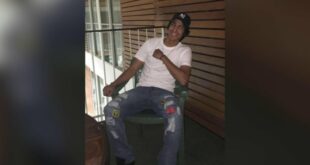Warning: Video contains graphic content and explicit language

Playing with fire: The faces of the fentanyl epidemic
Featured VideoWarning: This video contains graphic content and explicit words A toxic drug supply. Increasing overdoses. A lack of support and housing. This is the human side of Ottawa's fentanyl crisis.
It's 10:45 a.m. on a Tuesday in downtown Ottawa.
There's a man convulsing on Rideau Street and a small crowd gathers around to help while others walk by.
Another man watches the scene unfold while he injects himself in the leg, hurriedly, amid the sounds of approaching sirens.
It's a scene unfolding repeatedly across Ottawa and throughout the country.
Users who live on the streets see their peers dying this way almost every day. Front-line workers blame an increasingly toxic supply.
It's a life Jessica Currie couldn't have imagined for herself when she was younger. She said she's taken courses in graphic design and loves photography — she's an artist at heart.
"All my teachers were like, you're meant to be a graphic designer, you're meant to be a photographer, you're meant to be a dancer and singer. I was always in the plays and I did all that kind of stuff," she said.
Currie shared her story in between supervised injections of fentanyl at the Sandy Hill Community Health Centre. It's a place where nurses can be present, in case she goes through an overdose herself.
She said she's lost hundreds of friends to overdose deaths.
"Oh my God, I've been out here since the beginning. Well, not the beginning of it, but the worst parts. Homeless, nowhere to go for three, almost three years now with a great loss of people in my life that I loved very much," she said.
Currie also has a daughter who is about seven years old. Currie said she was in the grips of addiction when her daughter was born but managed to get clean for a while.
"After the fourth, fifth year of her being on the Earth with me, I had a moment of PTSD where everything kind of fell apart in my life and I was remembering past things that I shouldn't have remembered. But then I turned to a break as a mother and that break turned into her never coming back."
She started using street drugs again — including fentanyl.
"Then every time I injected it, I found myself to be passed out somewhere, being molested, raped, robbed, or almost frozen to death or in some comparable position," she said.
"Every time I've woken up, I've been with that person that was hurting me. So it was like a fear of like, how the f–k am I going to survive this?"
Playing with fire
On the streets of downtown Ottawa, a hit of fentanyl can go for as little as $5 — it's more accessible than cannabis and beer in Sandy Hill.
For Currie, it's a daily affair and she said she has also overdosed — twice.
"The first one was at a buddy's house and I think they Narcan'ed me about seven times. It was frightening," she said.
"I'm like, 'I can't breathe. I can't breathe.' So I reached over and I saw another Narcan. So I Narcan'ed myself."
She said while living on the streets, the risk is too high to get clean.
"If you don't use in the streets and you're dope-sick, you're vulnerable and you're not safe. You're basically gonna be on the ground twitching, convulsing. You're not gonna have the strength to move. You're gonna wanna vomit. You're gonna be shitting and pissing your pants."
She knows the dangers very well, but she said the fear of dying is not her main concern.
"It's so sad to say that, but I haven't heard from my family in almost four years. So, what do I have to live for, really?" she said.
That answer may sound shocking, but it's a common sentiment among fentanyl users who agreed to speak to CBC Ottawa for this story.
Testing a toxic supply
Jason P. LeBlanc is someone you might walk by at your local park. He spends a lot of time by the river, often with a community of friends — users who look out for each other.
"We go down to Strathcona Park. We talk, watch the river, the ducks, stuff like that," he said.
LeBlanc has been on the streets, on and off since he was 13. Some nights he sleeps in dumpsters and other nights he sleeps under someone's front porch.
The other day I tested my drugs and they were three per cent fentanyl, 97 per cent unknownso you don't know what you're putting in your veins.
– Jason P. LeBlanc
He's been using for a long time, starting with OxyContin, but while trying to get off those drugs, someone offered him a pharmaceutical fentanyl patch.
"I did it and woke up in the hospital," he said.
From then on, LeBlanc said he has been hooked.
"It's a hole I can't fill up, every day I wake up I can't not think about."
Quitting is not on his mind but given the increasingly unpredictable and deadly supply, LeBlanc has been testing his drugs at the Sandy Hill Community Health Centre, where a relatively new drug-testing machine provides users with the exact potency and ingredients in their drugs within minutes.
"The other day I tested my drugs and they were three per cent fentanyl, 97 per cent unknown so you don't know what you're putting in your veins."
The drug-testing machine has been so popular, there's often a lineup. Mostly users, but also university students and casual users looking for information about what they're about to ingest.
But despite risks of putting an unknown substance in his veins, LeBlanc said it's worth it.
"There's no worry cause it takes away the pain from things that have happened in my life, right?"
He's survived — by his own estimate — some 20 overdoses and he's lost a lot of the community he once had.
"When you hear ambulances, you say, that's probably someone dying of fentanyl," he said.
Both Currie and LeBlanc said housing — particularly supportive housing — is what they need to start rebuilding their lives.
"I have a little girl. I need consistency in my life. I need to sleep. I need to eat. If I'm outside, I'm not sleeping. You've gotta be an idiot to sleep out here because you're gonna get robbed and hurt," said Currie.
For LeBlanc, it's simply about the safety of a place to call home.
"Housing would give me the chance to just sit down … open up a book and read and then sit down, enjoy a book," he said. "The feeling [that I'd have]: 'this is mine.' You know?"
ABOUT THE AUTHOR
Reporter, producer and news anchor
Omar Dabaghi-Pacheco likes to chase the people behind the stories. His pursuit of documentary storytelling has taken him across Canada and to remote areas in Africa. In his off time, you'll find him engaging in extreme sports around the globe. You can reach Omar at omar.dabaghi-pacheco@cbc.ca.
With files from Ryan Garland
*****
Credit belongs to : www.cbc.ca
 MaharlikaNews | Canada Leading Online Filipino Newspaper Portal The No. 1 most engaged information website for Filipino – Canadian in Canada. MaharlikaNews.com received almost a quarter a million visitors in 2020.
MaharlikaNews | Canada Leading Online Filipino Newspaper Portal The No. 1 most engaged information website for Filipino – Canadian in Canada. MaharlikaNews.com received almost a quarter a million visitors in 2020.







